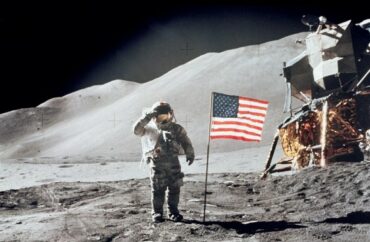
‘Future missions must consider mitigating deleterious effects on lunar environments’
University of Kansas researchers want academics to declare a new historic era to better study the “deleterious effects” of human exploration on the moon, according to a new journal article.
The article, published Dec. 8 in the journal Nature Geoscience, calls for the designation of a “Lunar Anthropocene” beginning in 1959 when humans landed the first spacecraft on the moon. An anthropocene is a geological era marked by human influence.
Lead author Justin Holcomb, a postdoctoral researcher with the Kansas Geological Survey at the University of Kansas, told the university news service that scholars already recognize the Anthropocene on Earth – “the exploration of how much humans have impacted our planet.”
In the article, Holcomb and his co-authors said their goal in calling for a Lunar Anthropocene is to “prevent massive damage or a delay of its recognition until we can measure a significant lunar halo caused by human activities, which would be too late.”
“We know that while the Moon does not have an atmosphere or magnetosphere, it does have a delicate exosphere composed of dust and gas, as well as ice inside permanently shadowed areas, and both are susceptible to exhaust gas propagation,” the authors wrote. “Future missions must consider mitigating deleterious effects on lunar environments.”
They said the moon’s environment is being harmed by refuse from human space missions, including “discarded and abandoned spacecraft components,” “flags, golf balls, photographs, religious texts,” and more.
They said declaring a new era could help scholars study and address the problem.
Additionally, it could prompt anthropologists and archeologists to recognize and preserve humans’ “space heritage” by cataloging discarded items, footprints on the surface of the moon, and other artifacts, according to the article.
“The concept of a Lunar Anthropocene aims to raise awareness and contemplation regarding our impact on the lunar surface, as well as our influence on the preservation of historical artifacts,” Holcombe said.
Space exploration has caught the attention of scholars in many facets of academia. Earlier this year, an Indigenous scholars group said listening for evidence of alien intelligence could be problematic because it may be considered “eavesdropping” or “surveillance.”
In 2018, a staffer at Stanford University’s Clayman Institute for Gender Research wrote an article for NBC News arguing that “the patriarchal race to colonize Mars is just another example of male entitlement.”
MORE: Black physicist canceled for challenging narrative of ‘homophobic’ NASA telescope
IMAGE: NASA





Please join the conversation about our stories on Facebook, Twitter, Instagram, Reddit, MeWe, Rumble, Gab, Minds and Gettr.